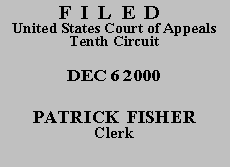

| WALTER OTIS HEAD,
Plaintiff-Appellant, v. KENNETH S. APFEL, Commissioner, Social Security Administration, Defendant-Appellee. |
|
The district court in this action entered judgment for defendant, affirming the Commissioner's decision concerning plaintiff's social security benefits. The Appeals Council held that plaintiff's disability insurance benefits were not subject to offset under 42 U.S.C. § 424a and that plaintiff was receiving the proper amount of benefits as determined by the Social Security Administration in a decision issued March 10, 1996. See R. Vol. I, Doc. 42, Ex. 4 (Decision of Appeals Council) at 3. We have jurisdiction pursuant to 42 U.S.C. § 405(g) and 28 U.S.C. § 1291. We affirm.
The only issue raised by plaintiff in this appeal is whether the district court properly denied plaintiff's motion filed on July 6, 1999, seeking default judgment against the defendant for failure to answer or otherwise plead by June 23, 1999, as previously directed by the district court. R. Vol. I, Doc. 11. In the default motion, plaintiff requested that the court reopen an earlier action against defendant (Dist. Ct. No. 94-Z-1100) "to allow the Defendant to correct their error and pay the Plaintiff all back benefits in which he was entitled." Id. at 1. Plaintiff also asked for 6.5 million dollars "in relief to cover all costs and damages." Id.
Plaintiff contends that the district court erred in not granting default judgment and requests that we reverse that court and enter judgment for him. He does not challenge the final decision of the district court upholding the agency's determination.
A district court's decision to enter a default judgment is committed to the sound discretion of the district court, and our review is for an abuse of that discretion. See Dennis Garberg & Assocs. v. Pack-Tech Int'l Corp., 115 F.3d 767, 771 (10th Cir. 1997); see also Panis v. Mission Hills Bank, N.A., 60 F.3d 1486, 1494 (10th Cir. 1995) (district court did not abuse discretion in permitting out-of-time answers and denying plaintiff's motion for default judgment where defendant's late filings were due to mistake, inadvertence, or carelessness, not bad faith). We will not disturb the court's determination without a distinct showing that it was based on a clearly erroneous factual finding or an erroneous legal conclusion or that it manifests a clear error of judgment. See United States v. Mitchell, 113 F.3d 1528, 1531 (10th Cir. 1997).
Moreover, under Fed. R. Civ. P. 55(e), judgment by default should not be entered against the United States or an agency thereof "unless the claimant establishes a claim or right to relief by evidence satisfactory to the court." Nor may default judgment be entered against the Untied States as a sanction. See Graham v. United States (In re Graham), 981 F.2d 1135, 1142 (10th Cir. 1992) (citing Bankr. R. 7055, applying Fed. R. Civ. P. 55(e)). When the government's default is due to a failure to plead, typically the court will either refuse to enter a default or will set aside the default. See Mason v. Lister, 562 F.2d 343, 345 (5th Cir. 1977).
Here, the government responded to plaintiff's motion for default within two weeks, see R. Vol. I, Doc. 14, and simultaneously requested an extension of time in which to answer or otherwise plead. See id., Doc. 15. The government further explained that it had been unable to obtain the administrative record and had inadvertently failed to note the answer due date. See id. at 1. The district court granted the extension of time to July 26, 1999, see id., Doc. 18, and the government's answer was filed on July 29. See id., Doc. 19. In its September 2, 1999 order denying various pending motions, the district court adequately explained the factors underlying its reasons for denying the motion for default judgment. See id., Doc. 31 at 1-2; see also Grandbouche v. Clancy, 825 F.2d 1463, 1468 (10th Cir. 1987). Finally, "[i]n light of the strong preference for the disposition of litigation on the merits, . . ." and the lack of prejudice to plaintiff, we conclude that the district court did not abuse its discretion in denying plaintiff's motion for default judgment. Gulley v. Orr, 905 F.2d 1383, 1386 (10th Cir. 1990); see also Jorden v. Nat'l Guard Bureau, 877 F.2d 245, 251 & n.23 (3d Cir. 1989) (recognizing "heavy burden" of plaintiff seeking default judgment against government agent and noting there was nothing in record to indicate defendants' conduct was beyond mere negligence, "rising to the level of flagrant bad faith or contumacious behavior.") (further quotation and citations omitted).
The judgment of the United States District Court for the District of Colorado is AFFIRMED.
The mandate shall issue forthwith.
Entered for the Court
Circuit Judge
*. This order and judgment is not binding precedent, except under the doctrines of law of the case, res judicata, and collateral estoppel. The court generally disfavors the citation of orders and judgments; nevertheless, an order and judgment may be cited under the terms and conditions of 10th Cir. R. 36.3.